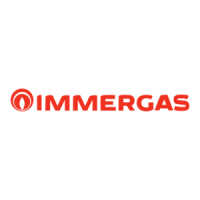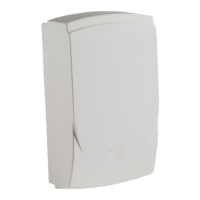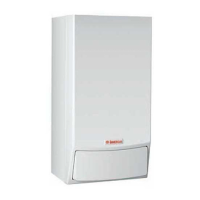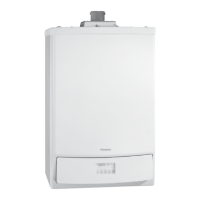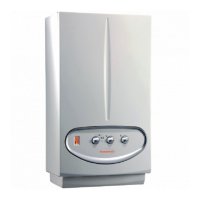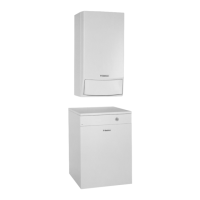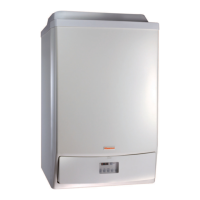8
INSTALLER
USER
MAINTENANCE TECHNICIAN
N.B.: wall mounting of the boiler must guarantee
stable and ecient support for the boiler. e
plugs (standard supply) are only to be used to x the
boiler to the wall; they only ensure adequate support
if inserted correctly (according to technical stand-
ards) in walls made of solid or semi-hollow brick or
block. In the case of walls made from hollow brick or block,
partitions with limited static properties, or in any case walls
other than those indicated, a static test must be carried out
to ensure adequate support. e boilers must be installed in
a way to prevent collisions and tampering.
N.B.: the hex head screws supplied in the blister pack are to
be used exclusively to x the mounting bracket to the wall.
ese boilers are used to heat water to below boiling
temperature in atmospheric pressure.
ey must be connected to a central heating system
and domestic hot water circuit suited to their perfor-
mance and capacity.
Risk of damage due to corrosion caused by unsuitable
combustion air and environment.
Spray, solvents, chlorine-based detergents, paints, glue,
ammonium compounds, powders and similar cause
product and ue duct corrosion.
- Check that combustion air power supply is free from
chlorine, sulphur, powders, etc.
- Make sure that no chemical substances are stored in the place
of installation.
- If you want to install the product in beauty salons, paint
workshops, carpenter’s shop, cleaning companies or
similar, choose a separate installation area that ensures
combustion air supply that is free from chemical substances.
- Make sure the combustion air is not fed from chimneys that
were used with gas boilers or other heating devices. In fact, these
may cause an accumulation of soot in the chimney.
Risk of material damage aer using sprays and liquids
to search for leaks
Leak sprays and liquids clog the reference hole P1 (Fig.
49) of the gas valve, damaging it irreparably.
During installation and maintenance, do not use spray
or liquids in the upper area of the gas valve (side refer-
ring to the electric connections)
Filling the condensate drain trap.
On rst lighting of the boiler, ue gas may
come out from the condensate drain; af-
ter a few minutes’ operation, check that this no
longer occurs. is means that the drain trap is
lled with condensate to the correct level pre-
venting the passage of ue gas.
ATTENTION:
- Type B open chamber boilers must not
be installed in places where commer-
cial, artisan or industrial activities take place,
which use products that may develop volatile
vapours or substances (e.g. acid vapours,
glues, paints, solvents, combustibles, etc.),
as well as dusts (e.g. dust deriving from the
working of wood, coal nes, cement, etc.),
which may be damaging for the components
of the appliance and jeopardise functioning.
- Unless otherwise provided for by local reg-
ulations in force, congurations B
23
and B
53
:
the boilers must not be installed in bedrooms,
bathrooms or bedsits. ey must neither be
installed in rooms containing solid fuel heat
generators nor in rooms communicating with
said rooms.
- e installation rooms must be permanently
ventilated, in compliance with the local reg-
ulations in force (at least 6 cm
2
for every kW
of installed heat input, except in the event of
any increases needed for electro-mechanical
vacuum cleaners or other devices that could
put the installation room under vacuum).
- Installation of appliances in B
23
and B
53
con-
guration is recommended in non-residential
premises and which are permanently ventilat-
ed.
ATTENTION:
failure to comply with the above implies
personal responsibility and invalidates
the warranty.
